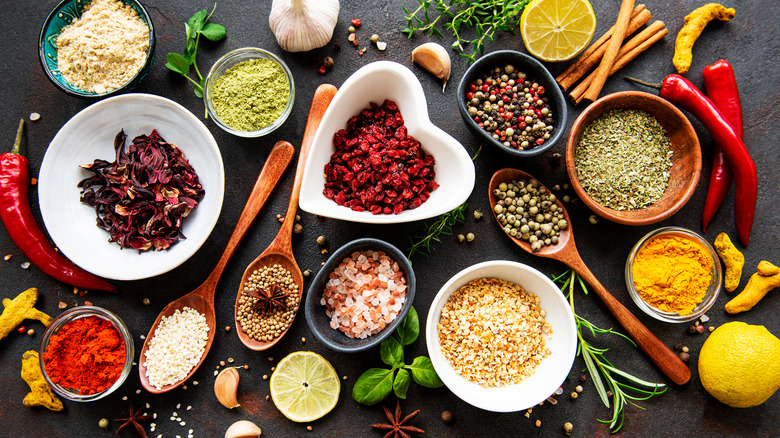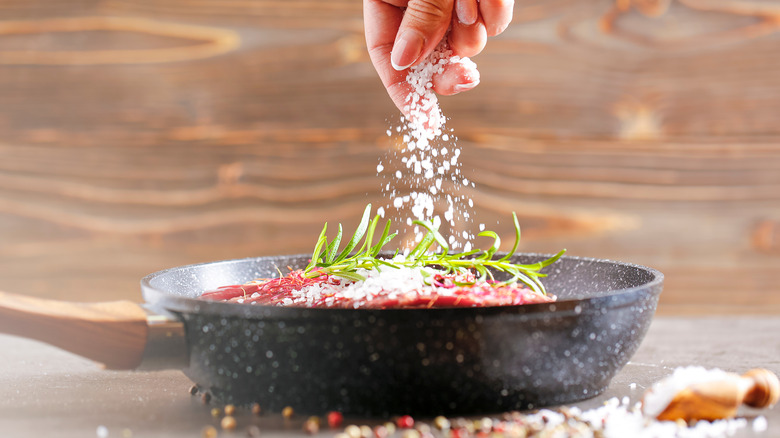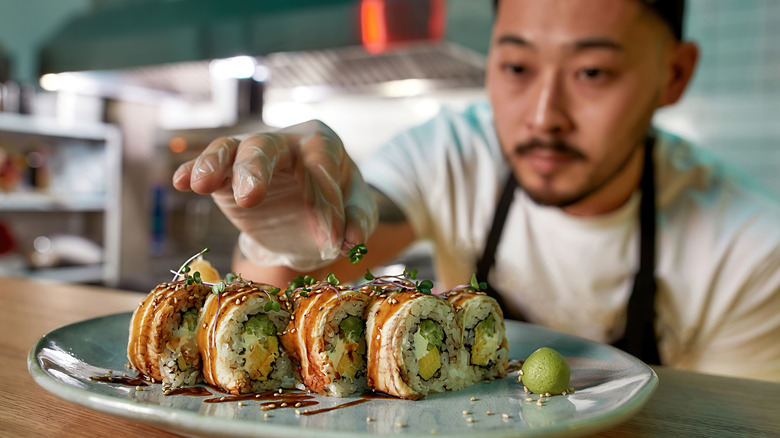The Best Time To Season When Cooking
Many chefs have said cooking is like jazz, it's improvisational and expressive, but it follows a rhythm (via HuffPost). As a cook, finding this rhythm means having a deep understanding of how time affects your dish, and using that knowledge to get the most out of your ingredients. A recipe may tell you the cooking time, but true from-the-hip cooking comes with knowing (and feeling) when to stir or when to simmer, when to defrost and when to thaw, and most importantly when to season.
Because seasonings (herbs, spices, salts, and sugars) aren't uniform, there is no one-size-fits-all answer for adding them to a dish. There are, however, some general principles that can help guide decisions on how and when to use various types of herbs and spices. Though some insist that engaged cooking requires you to be tasting and seasoning throughout the entire cooking process, sometimes taste-testing isn't viable (such is the case with seasoning raw poultry). Understanding how seasonings release their flavor, and honing a sense of timing can transform your cooking and give you a better appreciation for your ingredients.
Salt rocks
Salt is one of the most dynamic seasonings in a cook's arsenal, and is an active part of the entire cooking process. Consider the role of salt as two-fold; a flavor component that adds essential saltiness, and a chemical component that interacts with every ingredient it touches. Seasoning meat with salt a few hours before cooking gives the salt time to draw water out of the meat, breaking down the proteins, eventually dissolving into the juices and reabsorbing back into the meat, flavoring it from within (via Boss The Kitchen).
Even in baking, salt is essential in the early stages of bread dough for strong gluten development, while also a necessary finishing touch to compliment the sweetness of decedent desserts like salted caramel. But the types of salts used in these situations may differ in their texture and level of saltiness. In the book "Salt Fat Acid Heat," Samin Nosrat differentiates the three main types of salt: Table salt, kosher salt, and sea salt. Table salt is most commonly found in shakers and is finer and denser, yielding a saltier salt. It's usually used after cooking or immediately after frying. Kosher salt is the standard, multipurpose salt that should be used at the beginning, middle, and end of the cooking process. It's coarse and tactile, dissolves quickly, and sticks when sprinkled. Natural sea salts have a unique texture and strong aromatics, making them optimal for garnishing on delicate sweets, like chocolate truffles, or hearty vegetables, like potatoes.
General seasoning guidelines
There are no concrete rules but some general guidelines to consider when seasoning. In general, dried or woody herbs and whole spices, like rosemary or bay leaves, are best used before cooking because their flavors aren't as easily extracted. They require time, moisture, or heat to release and infuse their flavor. But black pepper for example, as a whole peppercorn is used in brines or stocks because it slowly releases flavors adding depth and bite. When powdered, it's a key component of rubs, marinades, and base seasonings (per Nosrat). And fresh cracked black pepper is popular as a garnish for salads and pasta because it adds flavor, is aromatic, and is textually satisfying.
Conversely, Boss The Kitchen suggests fresh herbs and powdered spices fare much better post-cook. Fresh herbs are great for garnish because they haven't lost any moisture to a dehydrating process, retaining their essential flavors and powerful aromatics. Powdered spices are used for taste or for adding a pop of color to a recipe.
Though recipes will often add spices in the beginning, it's important to consider how long-term exposure to heat may cause flavors to gradually cook off and lose their intensity, so you may have to gradually add powdered spices during the cooking process. This is why tasting your dish throughout the cooking process is important; as you begin to recognize the flavor dynamics of seasonings while they're cooking, you learn how and when to use spices to fine-tune recipes.


